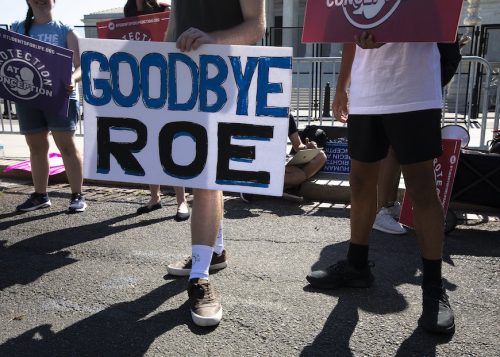By Kate Scanlon | OSV News
WASHINGTON (OSV News) — After 2022 offered a mixed bag of political outcomes for the pro-life cause, with the historic reversal of Roe v. Wade followed by ballot initiative losses in multiple states, pro-life activists are setting their sights on the 2024 campaign cycle.
The U.S. Supreme Court’s Dobbs v. Jackson Women’s Health Organization decision in June 2022 overturned a half-century of precedent of prior rulings by the high court making abortion access a constitutional right. But in the following months, as states began to put into effect individual laws protecting or limiting abortion, voters in six states either rejected ballot measures meant to restrict the procedure, or voted to codify measures protecting it.
In a Jan. 18 press call with reporters, just days before the first post-Dobbs national March for Life in the nation’s capital, representatives of the Susan B. Anthony Pro-Life America, which works to elect anti-abortion candidates, cast an optimistic tone about their chances in the next election cycle.
“All the work that we’ve already been doing with potential presidential candidates will have fruits,” Marjorie Dannenfelser, the group’s president, said, indicating its conversations with the potential Republican challengers to Democratic President Joe Biden. “They’re figuring out what their position will be in establishing a federal minimum standard (restricting legal abortion).”

Republicans were originally predicted by some analysts to have a commanding midterm performance in 2022, winning the House by a margin of as many as 30 seats, as Biden had low approval ratings due to inflation. But the GOP won just a razor-thin House majority and failed to win control of the Senate, bucking those early predictions.
Some Republicans, including former President Donald Trump, have sought to blame the issue of abortion for the party’s underperformance in the 2022 midterm election cycle.
Trump, who has declared his 2024 candidacy for president, accused pro-life voters of disloyalty to him by not showing up to vote in the midterm elections, saying in a Jan. 1 Truth Social post they “just plain disappeared, not to be seen again” after the Supreme Court overturned Roe.
But some election analysts argued that while the issue of abortion energized Democratic voters, candidate quality issues with many of Trump’s handpicked Republican candidates, as well as his continued unfounded claims that the 2020 election was stolen from him, hurt his party’s standing with voters.
Without naming Trump, who was backed by SBA Pro-Life America in his previous bids for the White House, Dannenfelser argued that any Republican candidate who shies away from the issue of abortion has “very little chance of winning the nomination.”
Dannenfelser argued the lesson from the 2022 elections is that candidates who embrace what she called the “ostrich strategy” by failing to discuss their pro-life platforms won’t see electoral success by sidestepping the issue.
“The ostrich strategy is disastrous for candidates,” Dannenfelser said. “Because of the fear of the tsunami of Roe v. Wade being overturned, so many candidates decided to pretend like the wind wasn’t blowing, and when they got accused of being for complete bans — which no federal candidate was advocating for a complete ban — they said, ‘Well, how about those Redskins? Or how about foreign policy? Or how about anything but the abortion issue?’ There were a handful of candidates, too many, that did just exactly that.”
“Abortion really can hurt them when that’s how they behave,” she added, arguing that candidates who openly discussed the issue were the candidates who exceeded some forecasts. She singled out Florida Gov. Ron DeSantis — a Catholic who is seen as a potential Republican presidential candidate, but who has not as of yet announced his candidacy — as one example.






















